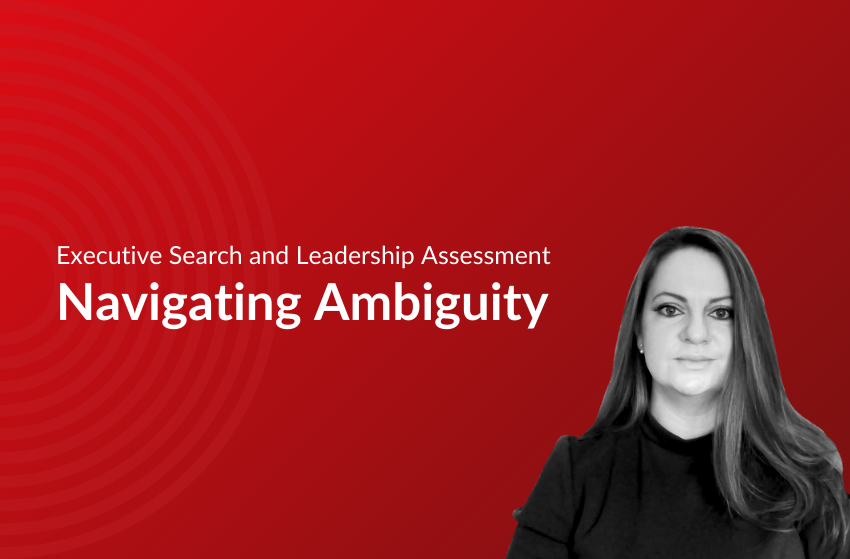When sourcing candidates for first-of-a-kind (FOAK) and frontier energy projects, one of the most critical traits I assess is the ability to thrive in ambiguity. In today’s volatile, uncertain, complex, and ambiguous (VUCA) world, leadership demands more than strategic vision, it requires a high tolerance for ambiguity and the capacity to adapt both personally and operationally.
Imagine leading an organisation where political will and public support ebb and flow over time. You’re balancing long-term ambitions, often spanning decades, against the reality of annual budgets and short-term scrutiny. The stakeholder landscape is vast and intricate, stretching across national and international boundaries, each with its own expectations and pressures. Additionally, all of this unfolds in an environment shaped by supply chain fragility, evolving regulatory frameworks, a persistent national skills gap, growing private sector competition, and the challenge of deploying technologies that are promising but not yet commercially proven.
This is the reality for many leaders operating at the forefront of energy innovation and major infrastructure delivery; disruption is steady state. Therefore, for those of us in executive search, we must seek out candidates who are not just “comfortable with ambiguity”, but capable of leveraging it, possessing the agency to not only respond to volatility but shape their new reality.
How We Assess Ambiguity Tolerance
Research into leadership in VUCA environments shows that success factors include: Judgement and intuition; Cognitive flexibility; Personality traits and life experiences and Professional experiences. Consequently we know that ambiguity tolerance is both innate and learned, a blend of mindset, experience, and adaptability. So how do we accurately assess these skills and traits and how do we benchmark a field of applicants in a search process?
At GatenbySanderson we have developed frameworks to assess ambiguity tolerance as a core competency which supports our ability to source candidates and our clients’ ability to evaluate them. We know that ambiguity tolerance is both innate and learned, a blend of mindset, experience, and adaptability. Our searches begin by identifying relevant professional environments and look for evidence of comparable scale and complexity, and those who face exposure to a plethora of existential variables, where decisions are made without all the information and often in rapidly shifting contexts. These conditions inform how individuals navigate uncertainty, exercise judgment, and lead with clarity and purpose despite the absence trail markers. We work with candidates to draw out and articulate the associated competencies and traits in CV’s, Supporting Statements and in Interview settings. We advise panels on the types of questions that illicit examples and we develop psychometric assessments to benchmark and evaluate values and behaviours.
If you’re preparing for a leadership role in a VUCA context, consider these questions to help articulate your experience to recruiters and hiring panels:
For Candidates: Reflective Questions to Demonstrate Ambiguity Tolerance
- What does ambiguity mean to you professionally?
- How do you approach strategic planning in uncertain environments?
- Where have you made a decision without all the requisite information?
- Have you built or transformed teams in response to volatility? What function was most beneficial?
- How do you assess a tolerable level of risk?
- Do you possess a high tolerance for ambiguity in your personal life? Where does it come from, and how has it shaped your career?
Building Capability: Our Workshop on Leading in Uncertain Times
Assessing for ambiguity tolerance is only part of the picture. We also work directly with leaders to strengthen their ability as well as their teams to navigate uncertainty. Our Leading in Uncertain Times workshops equip leaders and their teams with practical tools and behaviours to thrive when clarity is limited and pressure is high.
Participants:
- Learn how to manage personal stress and stay grounded when facing ambiguity
- Explore what others need in uncertain contexts and how to provide the support that reduced stress and increases engagement
- Build decision-making confidence when information is incomplete and time is short
- Practice essential leadership behaviours that create safe, trusting environments to guide teams through uncertainty
This learning experience helps leaders not just tolerate ambiguity but actively use it as a lever for engagement, trust, and better decision making.
If you’re navigating leadership challenges in central government or frontier innovation, Darra Power-Mooney from our Central Government Consulting Team can help. Darra specialises in identifying and developing leaders who thrive in ambiguity and complexity.
Connect with Darra Power-Mooney to explore how we can support your leadership strategy in a VUCA world.
“Uncertainty is where things happen. It is where the opportunities, for success, for happiness, for really living, are waiting.”
-Oliver Burkeman
